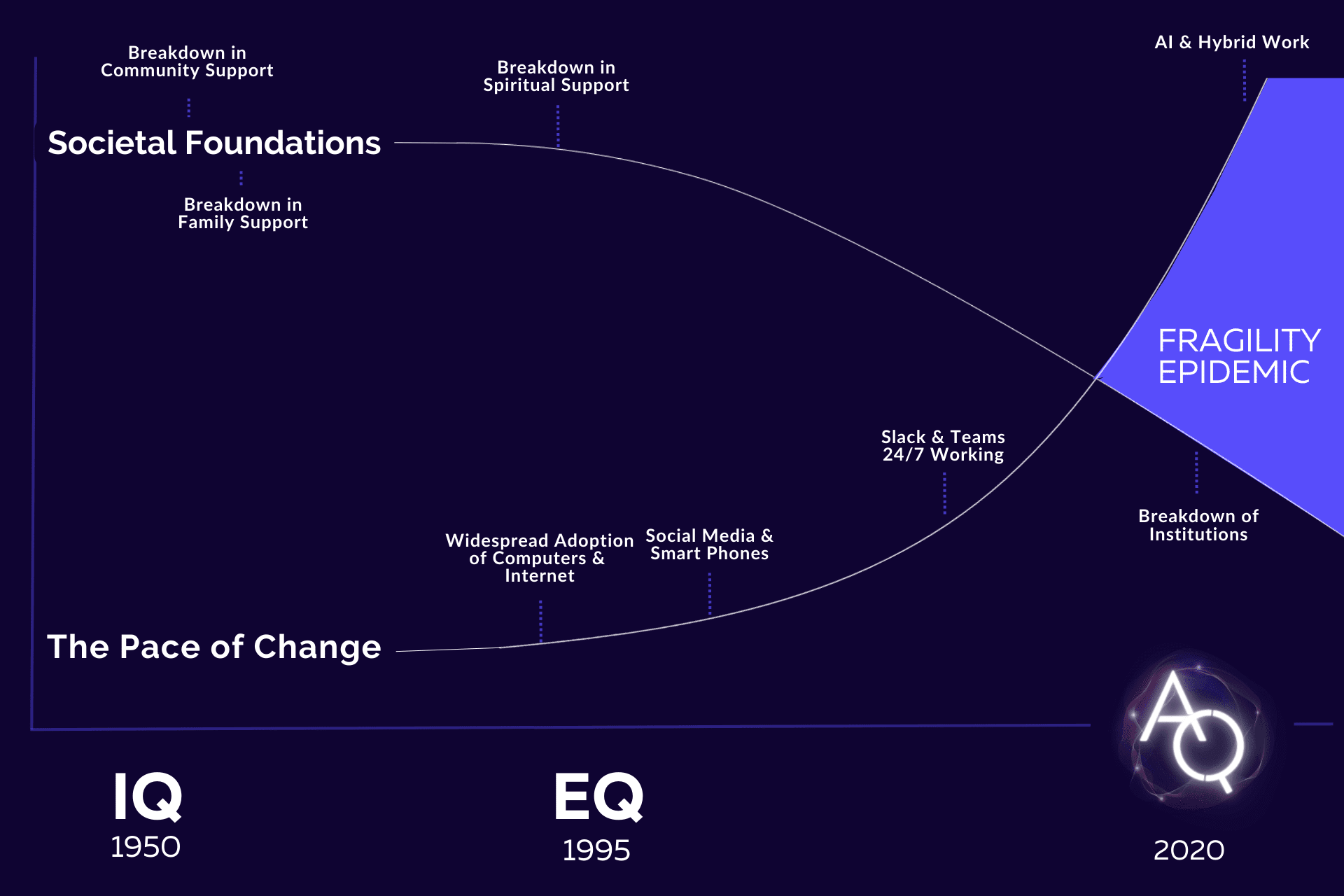Why Has Fragility Become So Acute?
trend one behind our increasing Fragility
Our societal foundation has been eroding
• Faith traditions and their virtues that guided billions of people for thousands of years are being abandoned rather than reformed.
• The concept of "community" has faded. The need to specialize in our education and work has increasingly led us to migrate away from family to urban areas. At the same time, the pendulum has swung from a collectivist mindset coming out of World War II to one of extreme individualism today. Consequently, never in history has such a high percentage of us lived so densely concentrated among people we don't know or care for.
• Families have been fracturing from increased rates of divorce and estrangement. The migration trend and general breakdown of the community mentioned above have left many non-traditional families needing more support than they historically received from extended family and community. Government agencies are now increasingly expected to care for our extended families.
We have never been freer to believe, say and do as we like. We're more unencumbered than ever by any guiding authority, whether a higher power, community leaders, elders, family traditions, or moral obligation to each other. And it's causing many to feel alone, lost, and directionless like kites blowing in the wind. We've evolved to become an instant gratification culture bent on pleasing ourselves and addicted to endorphins and numbing behaviors. We will do just about anything to avoid pain. And when the pain comes, and it always comes, we hurt even more because we're ill-equipped.
trend two behind our increasing Fragility
Our collective stress has been increasing
Globalization and technology have meant increased levels of competition felt everywhere. The education or apprenticeship that once served a person well for a lifetime may now be obsolete in a few years. Despite the powerful tools technology has placed at our fingertips, we must work more than ever to get by. The boundaries between our personal lives and work have become unrecognizable for many. And despite the increased working hours, more people and organizations than ever feel like they're on the verge of failing.
Considering both trends mainly occurred in the last 100 years, a tiny fraction of human history, we've essentially conducted a widespread and dangerous experiment that's wreaking havoc on our mental health and well-being. Are we surprised stress is being called the health epidemic of the 21st century?
We need a new paradigm to thrive
Prior to our societal institutions becoming fragile, and before globalization and technology had caused widespread disruption, our innate ability to grow stronger from adversity was largely intact and IQ was the go-to determinant of who would thrive.
With widespread adoption of the computer and internet, there was a leveling effect of raw intelligence relative to emotional intelligence. The ability to work quickly and collaboratively with others in leveraging the power of shared knowledge to obtain greater outcomes became critical such that by the mid-nineties, we realized EQ was often better than IQ at determining who would thrive.
As the decline of our institutions accelerated, technology and globalization marched on.
The iPhone, social media, and apps like Slack, which brought work to our nightstands, accelerated the pace of change. By the mid-teens, words like “grit” and “resilience” were being used to indicate who would thrive. They were also evidence of the fact that we had lost touch with our innate ability to grow stronger from adversity and felt collectively overwhelmed.
While the grit and resilience movements brought hope in our fight to keep up with change, their focus on “bouncing back” didn’t reactive our innate ability to grow stronger from adversity as evidenced by the staggering rise in depression and mental health issues. As new technologies like AI come on the scene, and the pace of change accelerates even faster, our ability to bounce back will diminish further and our mental health crisis is poised to worsen.

regain control & take action
If you’re looking to improve your personal and professional life by becoming more Antifragile, then don’t miss out on the Antifragile Movement.
Join a community of like-minded individuals who are dedicated to embracing uncertainty, leaning into feedback, and thriving in the face of adversity.
Gain access to valuable resources, expert guidance, and actionable strategies to help you cultivate and build an Antifragile mindset. Take the first step towards a more robust, adaptable, and fulfilling life by joining the Antifragile “AQ” Movement today!
more from the AQ blog
move forward
- 30-MINUTE REVIEW WITH A CERTIFIED AQ GUIDE
- LEARN WHERE YOUR GROWTH OPPORTUNITIES LIE
- COMPLiMENTARY FOR QUALIFIED LEADERS
gain control
- 90-MINUTE SESSION WITH A CERTIFIED AQ COACH
- DEFINE YOUR GROWTH OPPORTUNITES
- CREATE YOUR AQ GROWTH PLAN
